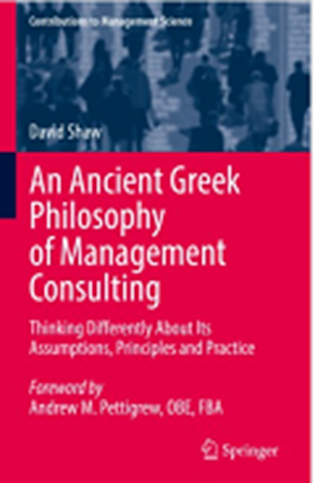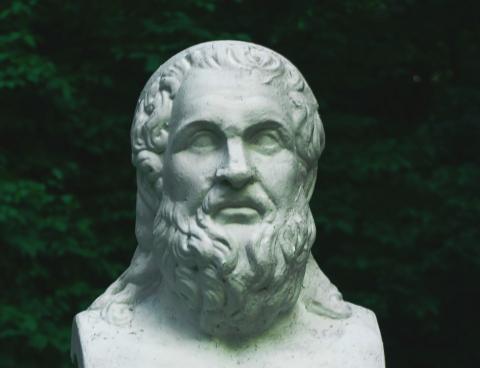Ethics, management consulting and the ancient Greeks
Report of the CMCE Virtual Showcase 8 February 2022

Any lecture that begins with a question “Are you familiar with Heraclitus and Aristotle?” followed up by “Do you know the link between Greek philosophy and management consulting?” may seem a little esoteric to those not versed in classical studies. However, David Shaw’s introduction to his book “An Ancient Greek Philosophy of Management Consulting” used the teachings of ancient Greek philosophers to provide a fascinating challenge to the way in which management consultants struggle to be trusted by clients and society. His premise was based on the perception that the results of management consultancy are intangible, its knowledge is unscientific, and its advice may be self-interested. The conclusion is that a reputation for ethical practice is therefore a critical asset for consulting firms. That may seem a little damning of management consultants, especially as David challenged whether we qualified as a profession without the safeguards and regulations of professions such as lawyers and accountants.
David provided an illuminating overview of Greek philosophical principles of ontology (what is the nature of reality) and epistemology (the study of knowledge) and the early Greek philosophers from the late sixth to the late fourth century BCE whose ideas shape the way we think today.
From the premise of strategic change as consultants’ core business, David explored how an organisation can be seen as a thing which can be changed into a different kind of thing and how the consultant’s intervention changes the organisation through a series of linear steps: Assess; Design; Implement; Evaluate, very much in line with the thinking of Leucippus and Democritus.
Heraclitus sees the world differently to them, like the flow of water in a river. The universe is constantly changing and is regulated by divine justice, so there is continuity as well as change. Divine justice is maintained by tension between opposed forces. The universe of opposites - management of dualities in organisational theory and thus the linear intervention becomes a circle where change is undertaken through an iteration of the steps.
David went on to talk about the type of knowledge that Management Consultants require to successfully undertake change in organisations.
Plato believed that reasoning rules. If you can’t express coherently how you know what you know then your claim is spurious. Aristotle believed that you could acquire knowledge by empirical observation combined with reasoning and defined two types of wisdom: sophia and phronesis. Sophia, intended as definite scientific knowledge, is acquired through empirical observation combined with reasoning which allows philosophers to contemplate the universe. Phronesis, or practical wisdom, is gained through experience to make good choices about practical matters. It’s the the fruit of years of experience. Scientific knowledge seldom helps with managerial decisions and political understanding is also required to make organisational change. Management and organisational change can be unpredictable and so phronesis rather than sophia is given prominence. Indeed, Mintzberg has stated that good managers have good practical experience and wrote the book on “Managers not MBAs” asserting that we need people with experience and wisdom as much as management education.
However, it can be hard for a management consultant to prove that they have experience-based insights. It is far easier to test for scientific or management knowledge.
Returning then to how consultants can make their clients trust them, if organisations are fluid, then it is difficult to get proof that management consultants have done some good. If knowledge and intuition is unverifiable then how is it possible to verify consultants claim to knowledge and experience? Lawyers and medics can fall back on their professional bodies, qualifications and the accepted body of knowledge which is required to be known. Clients of consultants have far fewer sources of assurance of ethical practice and perhaps market forces are the only reasonable protection against unethical behaviour.
The way that we think about ethics in today’s world is very influenced by Christian thought and belief in self-sacrifice, following rules and behaving ethically even in an unethical society. Aristotelian virtue ethics offers something very different. Ethical behaviour is looking for moderation between extremes, there are no definite rules that you can follow that will ensure that your behaviour is ethical and Aristotle believed that you would only acquire moral virtues if you were habituated by the leaders of the state. Humility and self-sacrifice are not seen as moral virtues and in the balance between extremes, taking less pay for work done would be as wrong as taking too much. Ethical action is about aiming at the right target rather than following rules and specific laws. So, if we want to embed a strong ethical culture within management consultancy, firms should provide a compelling vision, doing more to aim people in the right direction rather than defining prohibitions.
Moral virtues dispose people to behave ethically but must be combined with phronesis, good judgement, to make good practical choices in order to give effect to their moral disposition. Management should take more responsibility for embedding a culture that embodies commitment to ethical practice. If we follow Aristotle’s thinking, then the leaders’ prime concern should be habituating every consultant in their firm to ethical practice.
Aristotle and the early Greek philosophers lived in a very different world and looked at the world with very different views which can be difficult to translate into modern terms. However, the lively discussion which followed both in chat and through the Q&A session proved that taking time to consider what we can learn from them can provide an innovative way of thinking about today’s challenges.
For those who missed it, you can find a recording of the Showcase here https://vimeo.com/675911643
Ethics and professional standards is one of the key issues in management consulting that we want to get people’s opinion on, so please complete our short survey here to help us build up a picture of what’s important to practitioners, researchers and clients.
David Shaw is an independent researcher on the philosophy of management. He studied Classics at Oxford and turned to research and lecturing after a career in management consultancy. David was a finalist in the CMCE 2020 Research Awards with his paper “Aristotle and the Management Consultants: Shooting for Ethical Practice”.
Denise Fellows, a Past Master of the Worshipful Company of Management Consultants (WCoMC) and a judge on the panel for the CMCE Research Awards.
